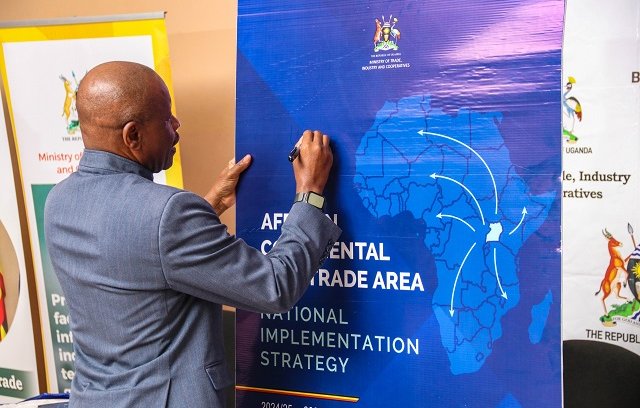Kampala, Uganda | Uganda has launched its African Continental Free Trade Area (AfCFTA) National Implementation Committee (NIC), signaling a renewed drive to leverage Africa’s single market for goods and services. The committee, composed of over 30 members from government, the private sector, civil society, and development partners, is tasked with coordinating Uganda’s participation in Africa’s largest trading bloc and advancing the country’s economic ambitions.
Speaking at the inauguration at Silver Springs Hotel, Bugolobi, on October 22, Gen Mbadi, Minister of Trade, Industry and Cooperatives, described the AfCFTA as “our generation’s greatest opportunity to build wealth here at home, together.” He highlighted tangible benefits for ordinary Ugandans: “It means the farmer in Mbarara can access a new duty-free market for his milk powder in Accra, Ghana. It means innovators in Kampala can sell their software to companies in Dakar, Senegal. And it means manufacturers in Namanve can reach a market of 1.3 billion consumers.”
The launch of the NIC underscores Uganda’s strategy to integrate more deeply into regional and continental markets. Ratified in November 2018, the AfCFTA complements the country’s National Trade Policy, the Fourth National Development Plan (NDP IV), and the Ten-Fold Growth Strategy. These frameworks collectively aim to expand exports, promote industrialization, create jobs, and diversify trade partnerships beyond traditional markets.
Gen Mbadi described the AfCFTA as the “rocket fuel” for Uganda’s tenfold growth strategy. “We cannot grow tenfold by only selling to current partners. The AfCFTA opens 54 new doors for our products,” he said. The NIC is charged with turning this opportunity into concrete results, bridging the gap between policy and business realities, and ensuring reforms translate into increased trade flows, industrial linkages, and market access.
Allan Senyondwa, director of policy at the Uganda Manufacturers Association, noted that maximizing AfCFTA benefits requires more than market access. “Uganda must increase production and engage in value addition. Neighboring countries like the Democratic Republic of Congo, South Sudan, and the Central African Republic are natural markets for our goods,” he said, citing a Memorandum of Understanding with Algeria as a platform for Ugandan exports.
Gen Mbadi urged committee members to act decisively. “Be bold, practical, and swift. Avoid bureaucracy. Focus on results that create jobs and put money in the pockets of Ugandans,” he said. The committee has already begun operationalizing its terms of reference, forming sub-committees, and adopting a work plan.
Supporting the NIC, TradeMark Africa, UNDP, and the British High Commission aim to ease implementation of AfCFTA protocols. Anna Nambooze, country director for Uganda and South Sudan, emphasized cross-sector collaboration: “Successful implementation of the AfCFTA requires government, private sector, civil society, and development partners working together.” She also praised Uganda Revenue Authority and government agencies for completing AfCFTA tariff schedule configurations, enabling Uganda to start trading under the agreement.
The NIC has set key priorities to ensure effective participation in the AfCFTA. These include coordinating policies across ministries and private sector stakeholders, moving from strategy to execution, addressing non-tariff barriers, simplifying customs procedures, strengthening standards and certification, and fostering value-chain linkages. Inclusivity is central, focusing on enabling small and medium enterprises, women-led businesses, and youth entrepreneurs to access continental markets.
The AfCFTA gives Uganda access to a market of 1.3 billion people with a combined GDP exceeding US$3 trillion. Gen Mbadi highlighted this scale as vital for industrial expansion, sustainable job creation, and regional competitiveness. “This is not just another trade agreement. It is the primary vehicle for achieving our Trade Policy objectives and a cornerstone for NDP IV,” he said.
The NIC will also track progress, ensuring accountability, monitoring milestones, and catalyzing action across government and private sector players. TradeMark Africa’s technical assistance includes operationalizing rules of origin, trade in services, competition policy, intellectual property rights, and private sector capacity building.
Gen Mbadi concluded: “We’re firing the first bullet for Uganda’s war in Africa. The talking is done; now it’s time to implement. Let the work begin.”
Uganda’s approach reflects a broader continental ambition under Agenda 2063, ensuring that trade agreements promote not only macroeconomic growth but also inclusive development for citizens. By combining policy coherence, private sector engagement, and technical assistance, Uganda aims to convert the AfCFTA into tangible economic gains, making ‘Buy Uganda, Build Uganda’ a reality across Africa.
